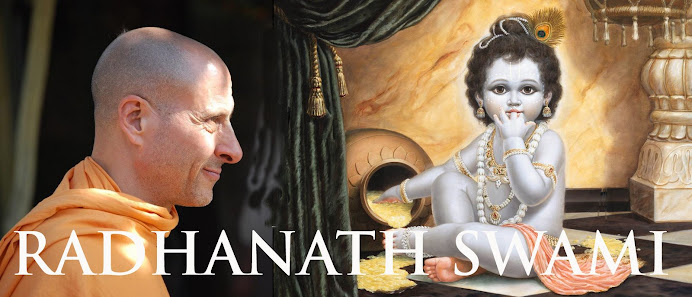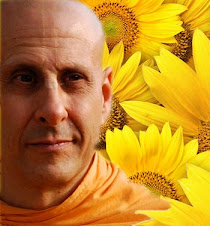Monday, January 20, 2014
Radhanath Swami on The Great God
We are infinitesimal beings who are conditioned with the idea of what is great and what is not. What can we do that is very great? If we do something a little greater than somebody else, it is considered wonderful. And then everyone must read about it, see it, and talk about it. The scriptures describe the activities of the Supreme Absolute Truth that has no limitation, who is all-knowing and can do anything He wants whenever He wants. He is the Controller of all controllers. There is nothing impossible for God. If there was anything impossible for God, there would be no such thing as God, because God by definition means the Complete Whole and the Supreme Controller. Therefore, it is not difficult for all of us to have faith in any story that comes in the authoritative literatures about God.
Monday, January 13, 2014
Radhanath Swami on Bhisma's Surrender
Why in the world would Bhisma want to take the side of, fight and give his life for irreligion? Since time immemorial, this has been a very perplexing and bewildering question. Many people say he was obliged to do so due to his position. But would such a great soul as Bhisma be afraid of going against such superficial principles of social morality at the cost of shooting arrows into the pure devotees of the Lord? On a very superficial level, it is true that he fought on the side of the Kurus because he was obliged to them socially. But the internal reason was that Bhisma was a completely surrendered soul. He was completely pure and had no ambition other than the pleasure of Krishna. His only motivation was to execute the will of God. Therefore, although Bhisma knew that he would be criticized and misunderstood for taking the wrong side for all time to come, he did not care at all for his own reputation. He knew that Krishna had a plan - He wanted to show that anyone who is not on the side of God would be vanquished. And this is the most important instruction for all humanity.
Sunday, January 5, 2014
Radhanath Swami on The Laws of Nature
During the making of the constitution of a nation, certain laws of the state are made. But unless there are some authorities to carry out and protect them, those laws have no meaning. Similarly the Lord has created certain laws of nature, and are executed at every step by a law maker. For every action there is an equal corresponding reaction. This is a law of nature. Although this is the law, karma means that according to how you live your life, there will be a certain state of consciousness, a certain thought at the time of death, and according to the nature of that thought you will be carried to the next body. At the time of death, a living being is carried by his subtle body to another gross body. Higher authorities decide what kind of gross body the living entity will have according to the way he has lived his life.
Sunday, December 29, 2013
Radhanath Swami on Developing Faith
We must know how important it is to hear from the scriptures and the great souls with a humble disposition of mind, so that we can really and truly understand spiritual principles and gradually develop faith. The whole purpose of scriptural knowledge is to give us some faith, faith in a higher principle and a faith in the truth. Knowledge is not just so that we can become a jnani and say, "Yes, I know the truth." The whole purpose of this knowledge is to change our life, to change our whole outlook on reality, to teach us how to give up sinful activities and live for a higher purpose. By hearing from the great souls, by learning how to practically understand those truths beyond our experience, we develop a faith, we develop a conviction, we develop a vision. The purpose of this vision is to change the direction of our life, to change our whole way of thinking, feeling and willing.
Sunday, December 22, 2013
Radhanath Swami on A True Devotee
The fruit of spiritual knowledge is to become humble and serve the Lord and His devotees. Although very elaborately and very philosophically mentioned in the scriptures, the essence of the highest knowledge in all creation is very simple. A true devotee is one who never finds faults in others. The scriptures do not say that one who is very learned, or one who is very austere, is a good devotee. One who is a humble servant of the Lord will never find faults in others. On the other hand, he will always see a positive opportunity to bring others up in spiritual consciousness. He is so humble and soft that he doesn’t feel he is entitled to find fault in others. This is one of the essential symptoms of one who has changed his heart, and one who is actually tasting the higher principle of glorifying the Lord.
Sunday, December 15, 2013
Radhanath Swami on Superficial Belief
People do not have the access to experience a realization of the knowledge of the Absolute. Because of their conditioned state of consciousness, their tendency is to try to relate everything to their own experience. That is the nature of conditioned ego, that it must comprehend something on the basis of its own relative experiences in this world. That is why so many people have such a difficult time in really, deeply & truly believing in God. Most people in religions throughout the world say yes I believe in God, because they want to believe in God for the sense of security it gives. They are afraid that life will be so utterly futile if there is no God. But deep down in their heart of hearts, they really do not know. They fail to admit it to themselves, what to speak of others in the society.
Saturday, December 7, 2013
Radhanath Swami on Seeking Pleasure
Pleasure is the motivating force within everyone’s life. If we analyze scrutinizingly everything we do, the motivation is the pursuance of pleasure. The Bhagavad-Gita describes the three modes of material nature: goodness, passion, and ignorance. According to these modes, different classes of living beings seek pleasure in different ways. Those in the mode of ignorance seek pleasure through intoxication, sleep, and violent and cruel acts upon others. Those in the mode of passion seek pleasure through amassing great fortunes, getting prestige and indulging in sensual activities. And those in the mode of goodness take pleasure in doing good for others - the feeling that I am giving in charity, I have lent my helping hand for another’s benefit. But in all cases we are looking for the same elusive object - pleasure.
Subscribe to:
Posts (Atom)


